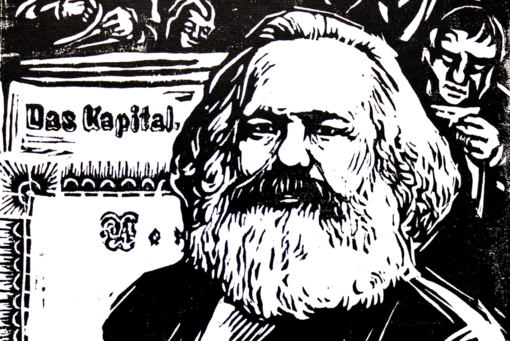
Photo source Royal Opera House Covent Garden | CC BY 2.0
That Marx was a great, ground breaking revolutionary thinker is no longer at issue. The more interesting question is why some of his predictions did not come to pass. Many have tried to answer that question from Gramsci to Adorno to Habermas to Wallerstein. The questions are almost always the same: Why hasn’t capitalism collapsed? Why did the Western proletariat attain high levels of affluence rather than fall into an historically explosive pit of immiseration? And finally why didn’t capitalism transform itself into some form of humanly satisfactory communism?
Marx famously stated that “The bourgeoisie cannot exist without constantly revolutionizing the instruments of production, and thereby the relations of production, and with them the whole relations of society.” It is my contention that in this crucial sentence Marx basically answered the questions that future thinkers would throw at him and at the totality of his greater theory. Yes; quite simply, the bourgeoisie (or whom we might today call the global elites) cannot survive without revolutionizing social and political relations as well as cultural and philosophical values. This last part is the missing key to Marx today, tentatively provided by Marx himself and later elaborated by sociologists such as Max Weber and others.
Thus, we must try to explain why, while never loosing sight of Marx, after two hundred years modern capitalism has not collapsed? Why has it survived numerous, severe crises? Why living standards of the majority (in the West at least) have dramatically risen compared to 1848 and for that matter 1948? Where did Marx’s theory go wrong and why?
And furthermore why is capitalism so fantastically adaptive/transformative?
The philosophy of half a loaf. The bourgeoisie in the west (or the various historical elites) realized very early on that they would have to “share” their world. That in the long run, if they were to survive, and to avoid the “specter of communism” they would have to create the social and political conditions which would allow their “lessers” to thrive and develop. And the historical record shows that that is exactly what they did. They actively responded to the social and political challenges of industrialization or put another way to the transition from pre-rational forms of traditional existence to newer more volatile forms of scientific productivity and discovery. Indeed, in the end, they were able to successfully manage the perpetual revolutionary state of modernity.
Modern man truly lives in Heraclitean times although he may often wistfully glance over his shoulder towards mythic eras of stasis and stability; towards Platonic rigidity. Yet, the attempted historical cancellation of modernity by various forms of Fascism and/or the imposition of highly centralized/undemocratic forms of modernity have proven unstable dead ends (the hybrid case of China is still in development).
Capitalism is an economic/social tool born of the scientific revolution/awakening begun during the late middle ages and the renaissance. Its trajectory however; its historical development is conditioned by the changing value inputs required of it: better health care and insurance, greater limitations put on child labor, pensions, worker safety, workers’ skills and educational development, women’s participation and equal pay, environmental issues, etc…capitalism is a scientific tool driven, in the best case, by politically/socially articulated values held, at any particular time, by the civic society at large and pushed through, not necessarily by the proletariat, but by the middle and upper class elites in business and politics and the universities which have accepted them as their own.
Capitalism is existentially value neutral; it is an economic tool/method/application that can be equally used by authoritarian, liberal, socialist, and fascist societies. The difference lies in the input values: the moral values; the “what we want to do with it” question. Do we want to enhance individuals at the expense of the collective: here we have the traditional American model of capitalism. Do we want social cohesion and collective well being; here we have the West European model of capitalism. Do we want to subjugate our own population and threaten our neighbors; here we have the totalitarian model of capitalism whether wearing the traditional black or red face. Often aspects of all three models are found in any given modern day society.
Thus, capitalism is inextricably linked with the historical expansion of modern science/rationality/experimentation throughout all aspects of society. It is not necessarily so much about the “disenchantment” of life as Weber famously commented on but about its rationalization. Rationalization does not necessarily bring about “disenchantment”. Just as moral values are not necessarily (although they can be) dictated by scientific fact. Moral values are at their essence a moral choice. We must always at every moment be choosing the moral preferences and direction of our scientifically based society. Capitalism is but one aspect, if perhaps the most important one, of that society. But moral values do not necessarily have to reflect technology or existing economic relations. Technology and current economic organization can just as easily be the servant of the moral conscience. It is always a series of hard choices that every society has to negotiate for itself and in its own time.